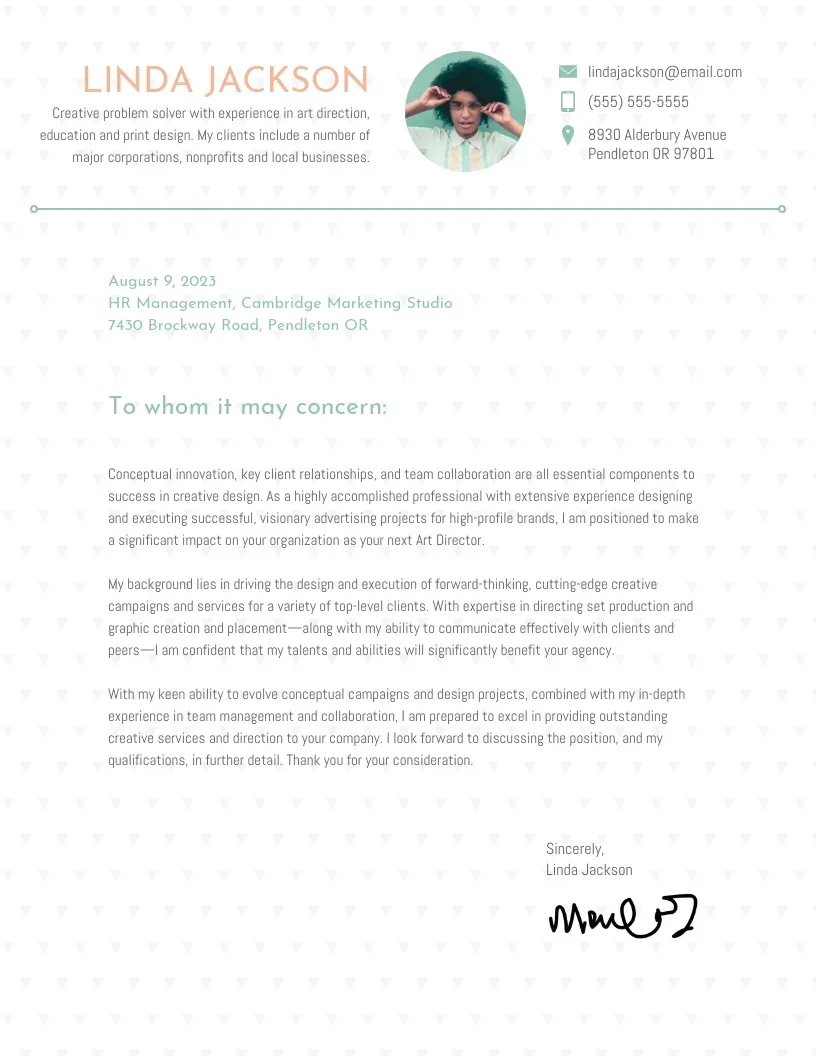Why a Copywriting Cover Letter Matters
In the competitive world of copywriting, a compelling cover letter is your first chance to make a lasting impression. It’s more than just a formality; it’s an opportunity to showcase your unique writing style, highlight relevant skills, and demonstrate your passion for the role. A well-crafted cover letter can set you apart from other applicants, giving you a significant advantage in the job application process. Without a strong cover letter, your resume might get lost in the pile, never reaching the eyes of a hiring manager. This is why it’s critical to invest time and effort into crafting a standout copywriting cover letter that grabs attention and gets you noticed. It’s a chance to demonstrate your creativity and writing prowess before you’re even asked to write a sample.
The Power of a Great Cover Letter
A great cover letter goes beyond simply restating your resume; it tells a story, demonstrating your personality and how your skills align with the specific job requirements. It’s a chance to explain any gaps in your experience or highlight any unique projects or skills that aren’t immediately obvious from your resume. A powerful cover letter can transform a potentially overlooked application into a compelling one. It allows you to directly address the needs of the employer, showing that you’ve done your research and understand what they’re looking for. Moreover, a well-written cover letter showcases your writing ability, a core skill for any copywriter, allowing you to demonstrate your flair for language, your understanding of tone, and your ability to engage an audience. This initial impression can be the deciding factor in whether or not you get an interview.
Top 5 Tips to Impress with Your Cover Letter
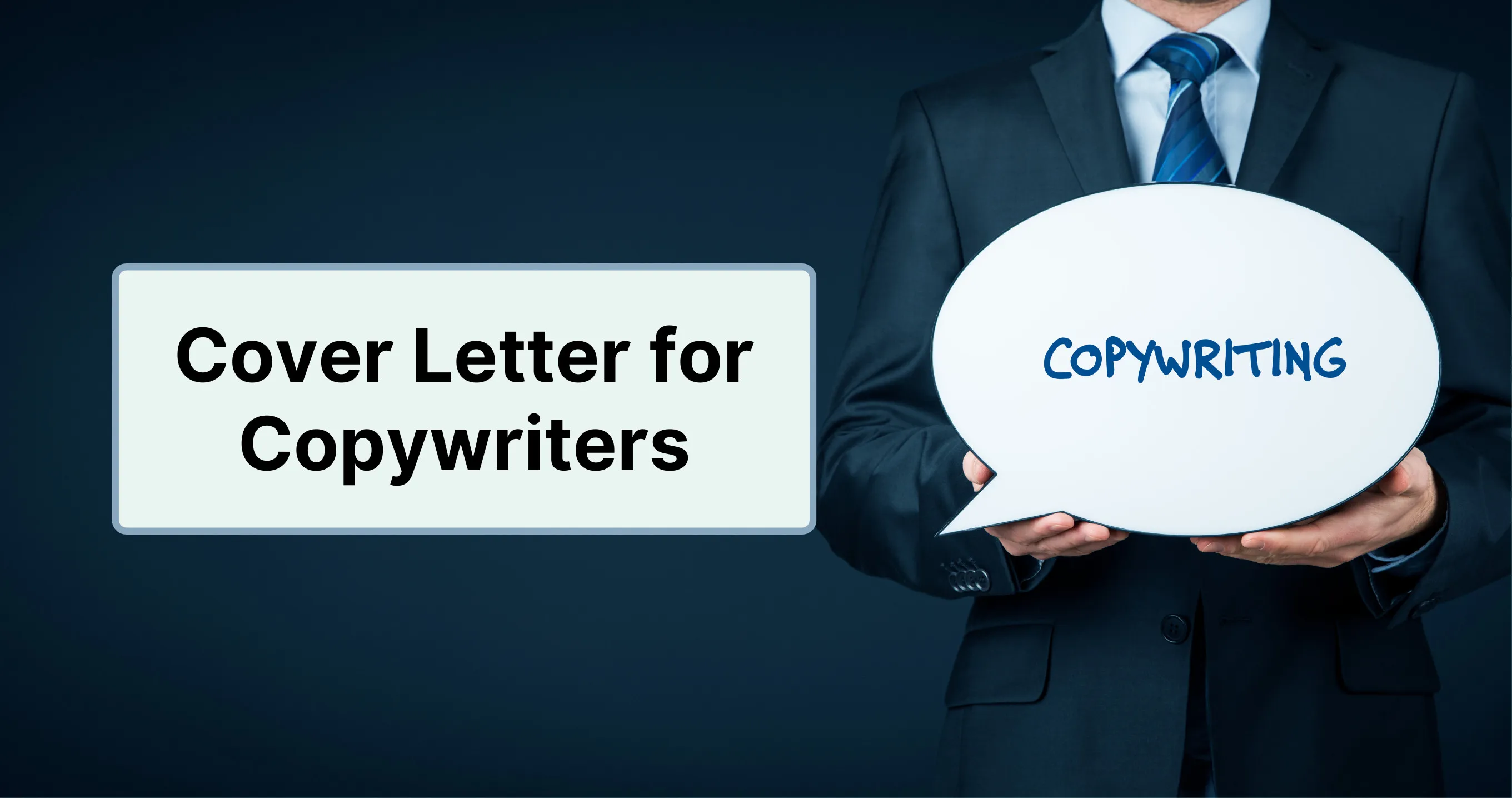
Crafting a cover letter that impresses requires careful attention to detail and a strategic approach. Here are five essential tips to help you create a standout cover letter. By implementing these strategies, you will increase your chances of landing an interview and securing your dream copywriting job. This will help you elevate your application and showcase your best qualities to potential employers. Following these tips will ensure your letter is not just seen, but remembered, making a significant impact on your job search.
Highlight Your Best Copywriting Skills
Emphasize the copywriting skills that make you unique. Do you have a knack for crafting compelling headlines, a strong understanding of SEO principles, or experience in a specific niche like e-commerce or healthcare? Detail your proficiency in persuasive writing, storytelling, and brand voice development. Use action verbs to describe your accomplishments, such as ‘developed,’ ‘created,’ ‘optimized,’ and ’executed.’ Tailor your skills section to match the specific requirements of the job description, showcasing relevant experience that directly aligns with the employer’s needs. This targeted approach will demonstrate your ability to deliver results.
Showcase Relevant Experience
Provide specific examples of your past copywriting work. Mention any successful campaigns you’ve worked on, highlighting the results you achieved (e.g., increased click-through rates, improved conversion rates). If you have a portfolio, be sure to include a link, making it easy for the hiring manager to see your work firsthand. If you are a new copywriter, focus on any relevant projects, such as personal blogs, volunteer work, or academic assignments that highlight your writing skills. Remember, the key is to demonstrate your ability to create effective copy that drives results. Show, don’t just tell, how your previous work has benefited others.
Quantify Your Achievements
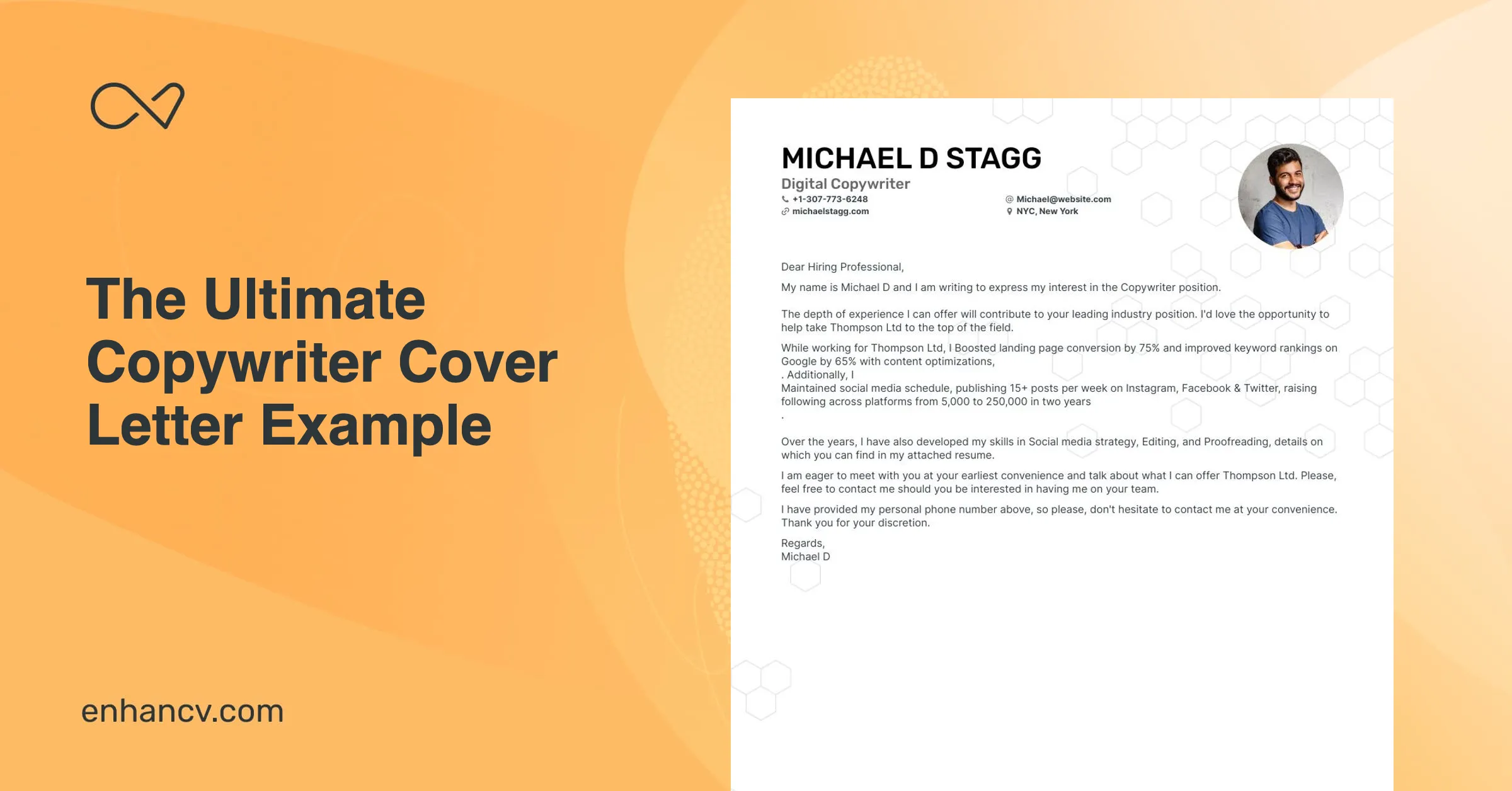
Use numbers and data to showcase your achievements. Instead of saying ‘Improved website traffic,’ state ‘Increased website traffic by 30% in six months.’ This level of detail adds credibility and provides concrete evidence of your abilities. Quantifiable results are far more impactful than vague descriptions, as they demonstrate the value you bring to a team. Include metrics such as conversion rates, click-through rates, and sales figures to give hiring managers a clear understanding of your impact. Demonstrating tangible results will highlight your value as a copywriter and make your application stand out.
Tailor Your Letter to Each Job
Avoid sending generic cover letters. Customize each letter to the specific job and company. Research the company’s mission, values, and the role’s requirements. Show that you understand their brand and are genuinely interested in the opportunity. Address the hiring manager by name, if possible. This shows you’ve taken the time to understand the position and are not just sending out a mass application. Mention specific projects or initiatives that resonate with the company’s goals. Personalization shows that you’re not just looking for a job, you’re looking for this job, at this company.
Perfecting Your Cover Letter Format
Your cover letter’s format is just as important as its content. Use a professional font, like Arial or Times New Roman, and ensure your letter is easy to read. Break up text with clear headings, bullet points, and ample white space. Keep your cover letter concise, ideally one page in length. Proofread meticulously for any grammatical errors or typos. A well-formatted letter demonstrates professionalism and attention to detail, making a positive first impression. A clean, organized layout will make your letter more approachable and easier for the hiring manager to read and comprehend.
Formatting and Structure for Success
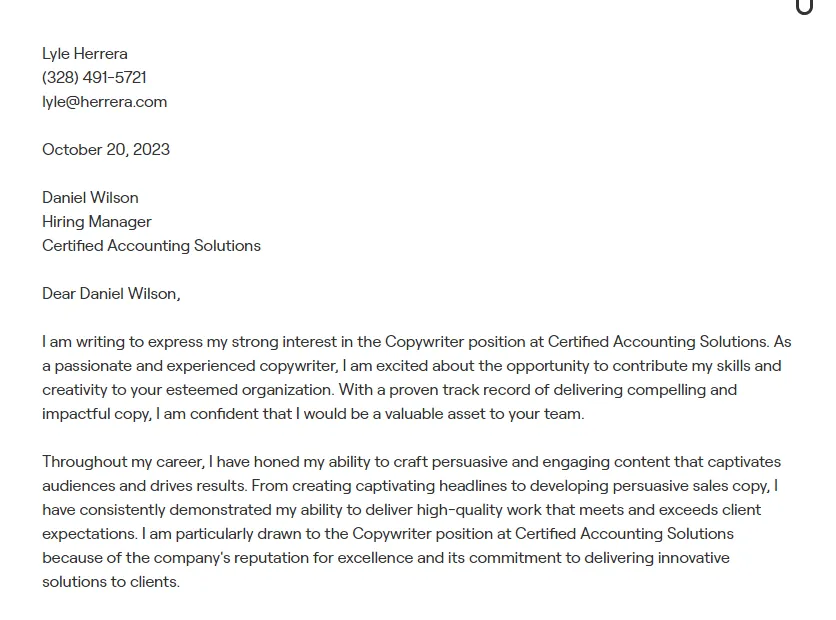
Structuring your cover letter in a logical and engaging way is crucial. Start with a strong opening that immediately grabs the reader’s attention, followed by a concise and compelling summary of your skills and experience. In the body, provide specific examples of your accomplishments and quantify your results whenever possible. Conclude with a call to action, expressing your enthusiasm for the role and your eagerness to discuss your qualifications further. Ensure that each section flows smoothly into the next, creating a cohesive and persuasive narrative. This clear structure will help you to convey your message effectively and demonstrate your qualifications to the hiring manager. Use headings and bullet points to improve readability.
Keywords and Tone to Use
Incorporate relevant keywords from the job description to ensure your cover letter aligns with the employer’s needs. This will help your application get noticed by applicant tracking systems (ATS). Maintain a professional yet engaging tone throughout your letter, showcasing your personality and enthusiasm. Use strong action verbs to describe your accomplishments and showcase your skills. Show confidence in your abilities, but avoid being arrogant. The tone of your cover letter should reflect the company culture. If the company has a more formal tone, then your letter should be too. However, avoid being generic.
Proofread and Polish Your Cover Letter
Before submitting your cover letter, carefully proofread it for any errors in grammar, spelling, and punctuation. Read your cover letter aloud to identify any awkward phrasing or sentences. Ask a friend or colleague to review it as well. A polished cover letter demonstrates your attention to detail and professionalism, increasing your chances of making a positive impression. Ensure that the formatting is consistent and the overall presentation is clean and appealing. These small details can have a huge impact on how your letter is received. Proofreading is a critical step that you should never skip.
Common Mistakes to Avoid
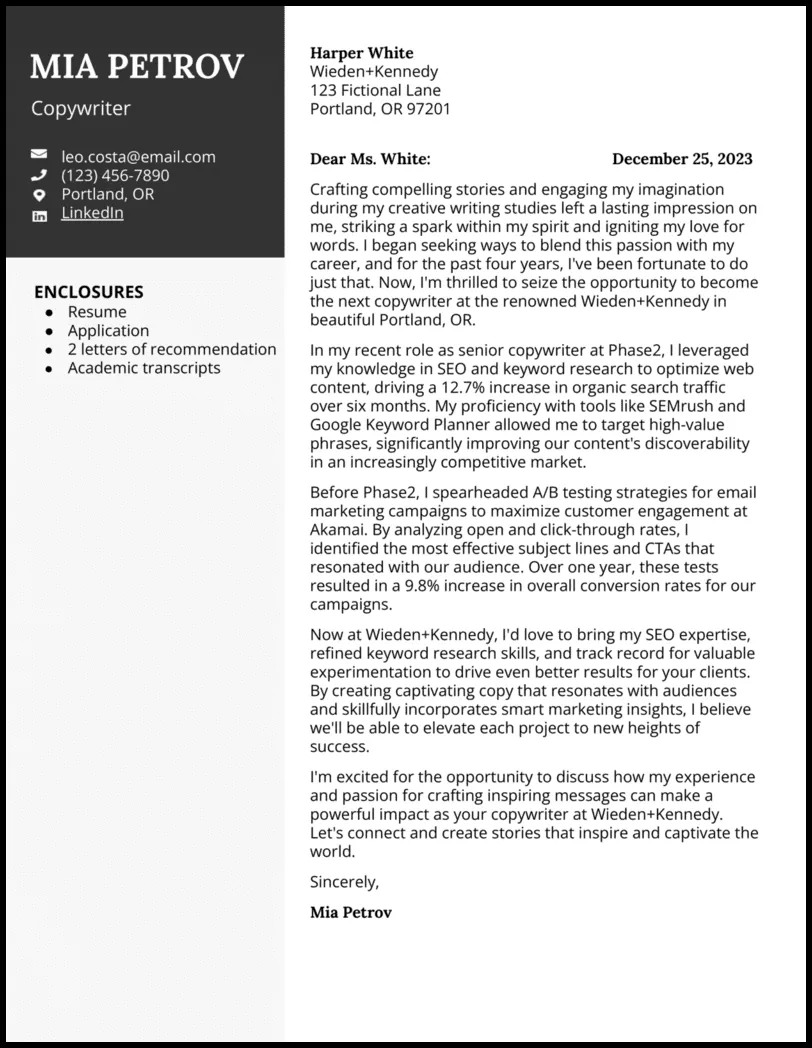
Avoid common mistakes, such as sending a generic cover letter, using excessive jargon, or including irrelevant information. Don’t simply restate your resume; instead, provide a narrative that highlights your skills and experiences. Ensure that your cover letter is free of grammatical errors and typos. Avoid a passive tone; be proactive in expressing your interest and qualifications. Never write the wrong company name or role in your cover letter. Avoid exaggerating your skills or experience. Honesty and accuracy are always the best policies, and any dishonesty will likely be revealed. Finally, do not include negative comments about previous employers or jobs.
Final Thoughts
Crafting a compelling copywriting cover letter is essential for landing your dream job. By highlighting your skills, showcasing relevant experience, quantifying your achievements, and tailoring your letter to each opportunity, you can significantly increase your chances of getting noticed. Remember to proofread your cover letter meticulously and avoid common mistakes. By following these tips, you’ll create a powerful first impression and demonstrate your value to potential employers. Good luck with your job search, and remember that your cover letter is a crucial step in presenting yourself effectively to the hiring manager.
